Özge Özkoç
Ankara University
Pınar Çağlayan
Uşak University
Dissertations are among the most important elements of academic production, along with scientific research articles and books. They not only reveal an academic’s field of research, but also provide clues as to what research methods and tools scholars will employ in postdoctoral studies. Moreover, and crucial to this paper, they are important indicators of the trajectory of research fields, as well as their general roles in the academic world. This study aims to reveal general trends/indicators in Turkish International Relations (hereafter IR) dissertations through an analysis of IR dissertations written in various Turkish universities between 2000 and 2020. There is a rather widespread claim among IR academics in Turkey that this particular community largely contributes to the Western-oriented discipline of IR as local or regional experts, dealing mainly with Turkish foreign policy and regional problems rather than with theoretical concerns in IR. A further aim of this study is to test whether this claim remains valid with the analysis of recent IR dissertations produced in Turkish universities.
1. Introduction
The discipline of International Relations (IR), born in Britain in the early 20th century and cultivated as a Western-oriented discipline in the United States after World War II, has spread to the periphery, including Turkey, over time. During the Cold War period, the development of the discipline of IR —which had arguably become a distinctly “American science”[1]— had its own limitations in the periphery, which in part led to the voices of periphery scholars having little resonance in the Western academic world.
More recently, however, a critical approach has emerged across the last three decades, in the Third World generally and in Turkey particularly, that underscores the need for the internationalization or globalization of IR studies.[2] In the Turkish context, scholars following such an approach frequently highlight that the IR community in Turkey has largely contributed to the Western-oriented discipline of IR as local or regional experts, dealing mainly with Turkish foreign policy and regional problems rather than with theoretical work in the field.[3] One central aim of this study is to test the validity of such a claim through an examination of dissertations written at Turkish universities over the last two decades. Moreover, and linked to the aim above, we also seek to reveal general trends/indicators in Turkish IR dissertations, as evidenced by the distribution of dissertation topics by university (including state and foundation universities), as well as by language, gender, and discipline.
Dissertations are, of course, among the most important elements (along with scholarly articles and books) in the production of academic knowledge. There are three main reasons behind their importance. First, for any discipline, dissertations constitute a first step towards becoming a scientist. Second, dissertations provide comprehensive information about the main research areas of scholars. Third, they provide clues as to what research methods and topics scholars may use in their postdoctoral phase. Considering that some researchers will hold senior positions in universities after their PhDs, examining the dissertations will inevitably be helpful in identifying the general trends in both specific topics and methodologies among Turkish IR scholars.
The study is divided into three main sections. The first section presents a brief review of the extant literature on this subject. The second, “Methodology and Research Design”, details how we have collected and classified the data. In the third section, “Evaluation of Dissertations and Findings", we examine dissertations in two parts. In the first, we classify dissertations in terms of year, university type, discipline, gender, and language, as part of a quantitative analysis. In the second, we determine the main and sub-research fields of dissertations under the discipline of IR. The data enable us to identify both the general trends in the field of IR based on dissertations in Turkey and the contribution of Turkish scholars to global IR.
2. Literature Review
There are a number of significant studies in the literature that, based on dissertations or publications, deal with the state of Turkish IR studies, scholars, and IR-related studies. In particular, since 2007, the International Relations Council of Turkey (IRCT) has played a leading role in developing knowledge about the transformations of the discipline of IR in Turkey and its contribution to global IR studies. In 2007 and 2009, IRCT carried out two surveys among IR scholars to assess their preferences, teaching experience, and the future prospects of the discipline.[4] Following these quantitative studies, IRCT has since carried out similar research in collaboration with the Institute for the Theory and Practice of International Relations at the College of William and Mary on the Teaching, Research and International Policy (TRIP) project.[5] In addition to the crucial contribution of the IRCT, two important studies have recently addressed the situation of IR scholars in Turkey. First, a study by Balcı, Cicioğlu, and Kalkan deals with the analysis of IR scholars and departments in Turkey, using data collected from Google Scholar citation counts.[6] Secondly, Emre Erdoğan reveals the academic background of IR and IR-related scholars working in Turkish universities using social network analysis.[7]
On studies dealing mainly with the state of IR studies in Turkey, there are three main articles. Firstly, Demir and Avcı survey the academic state of Turkish terrorism studies in comparison with international studies by collecting data from dissertations, articles, and interviews with terrorism experts.[8] Their work, which employs both quantitative and qualitative research methods, focuses on terrorism studies, which can be evaluated under the umbrella of security studies. In this respect, Demir and Avcı’s study seems to share common grounds with our research evaluating IR-related dissertations. However, our research differs from their work in two important ways: we focus on the general tendency of the discipline of IR based on dissertations, and we rely only on quantitative methods. Secondly, Yüksel aims to provide a brief overview of the state of Iranian studies in Turkey, with particular attention to three dissertations from various Turkish universities over the last three decades.[9] This study, based on a content analysis of these dissertations, contributes to the assessment of the condition of regional studies in Turkey. Finally, Turan’s article is another example, this time one dealing with American studies as a part of regional or area studies.[10] This article also bears certain similarities to our research, though it differs in important ways. In terms of similarities, clearly, Turan deals with an important topic directly related to the field of IR through an evaluation of American Culture and Literature Programs and publications based in the USA, including academic and scholarly journals, books, and research institutions. However, Turan has not paid special attention to dissertations written about the USA or US foreign policy under the umbrella of IR.
On the other hand, there are a few studies in the literature that focus on dissertations. However, it can be said that these studies do not deal with all dissertations in the field of International Relations, but rather focus on specific topics, such as terrorism and migration.[11] Overall, considering all these studies, our research promises to fill a gap in the literature with special attention to all PhD dissertations, in terms of university, discipline, gender, language, and more. Additionally, we aim to show the general trends of dissertations by identifying their fields under the umbrella of IR.
3.Methodology and Research Design
We collected the data from the Council of Higher Education’s National Theses Centre (NTC) website. Before collecting data from the NTC, we determined which research method would be more useful to obtain a broad picture of our discipline in terms of dissertations across the last two decades. There were two options: either an (IR) department-based search, or a keyword-based search. As is well known, besides IR departments, there are many departments and institutions at Turkish universities where researchers study IR-related topics or subjects. Therefore, we thought that collecting data not only from dissertations written in International Relations (and Political Science and International Relations/PSIR) departments, but also from those in departments related to IR, such as European Union Studies, Security Studies, History, or Regional Studies (mostly Middle Eastern Studies), would provide a better understanding from which to evaluate the state of our discipline. For this reason, we chose the term “international relations” as a keyword instead of conducting a department-based search.
We found 1,544 registered dissertations written across various university departments.[12] However, it was necessary to exclude certain dissertations deemed irrelevant to the field of IR. In order to determine which dissertations could not be evaluated under the umbrella of IR, we took into account their abstracts, keywords, departments, and titles. We thus settled on 1,415 dissertations to be examined in this study.
Based on these 1,415 dissertations, our study has two main aims. First, we aim to explain the general trajectory of our discipline by providing specific information about the researchers and universities where IR-related dissertations have been written over the last two decades. To this end, the data were classified according to the gender of the researchers, the language of the study, the year of dissertation submission, the university, and the department. Moreover, we classified these universities into state or foundation-run universities. Secondly, while defining the potential contribution of Turkish scholars to global IR studies, we aimed to reveal which subjects or topics have been prominent in IR studies due to international or regional developments. After collecting the data, we classified the dissertations by looking at titles, keywords, and abstracts. We defined five main and several sub-fields to show which research fields gained momentum in IR studies during which years.
In this study, we used bibliometric analysis and qualitative content analysis to categorize the data, examining the dissertation abstract and keywords. Bibliometric analysis became a method by which we could categorize dissertations quantitatively.[13] As we know, bibliometric analysis is a method that researchers use to analyse data. It is also a research field that applies mathematical and statistical techniques to study published models of information distribution. From this point of view, we have tried to use this method to determine the evolution of dissertations and general trends in time and space. In fact, this method is also used in the analysis of dissertations.[14] However, a bibliometric analysis based on IR dissertations in Turkey has not been done yet.[15] Moreover, qualitative content analysis is used to draw conclusions not only about the frequency of occurrence of words in a text, but also about the context and meaning of related words.[16] So, it can be said that our study is a good candidate to fill this gap in the literature by combining both approaches, using bibliometric analysis to codify the statistical information and qualitative content analysis to show the categories in which the dissertations were studied.
As seen in Table 1 below, in determining the main fields, we set out from a traditional categorization widely accepted by IR scholars: we initially divided IR studies into three main fields, namely “International Law” (IL), “International Relations Theory” (IR T), and “Diplomatic History” (DH). However, when analysing the data, it became necessary to add categories in order to define our discipline more clearly. For example, if a dissertation on IL or IR T included a case study, we used two additional main categories, such as IL+Case and IR T+Case. In particular, by using the category of IR T+Case, we aimed to reveal that researchers focused on the case with a theoretical framework, rather than making a purely theoretical contribution to global IR. At the same time, in order to clarify the difference between pure IL studies without cases and case-oriented IL dissertations, we elected to add IL+Case as another main field. The five main fields of our research thus were: IR T, IR T+Case, IL, IL+Case, and DH.
Yet the question remains, which criteria helped us to make a distinction between the main fields of IR T and IR T+Case? After much discussion, we reached a consensus to follow two approaches through which dissertations could be evaluated under the category of IR T or IR T+Case. First, when reviewing titles and abstracts, we ensured that when a theoretical framework was indicated alongside a case (e.g., "constructivism is used as the theoretical framework for this study"), we categorized the dissertation as IR T+Case–“constructivism”. If the researcher did not directly mention a theoretical perspective, we tried to categorize such dissertations by looking at abstracts and keywords. For example, if the researcher’s study was about global identity/European identity, we preferred to categorize his/her study as "constructivism". However, if she/he focused on national identity, we evaluated it as "nationalism/ethnic studies/minorities". Similarly, if research was conducted on perceptions, discourse, otherization, or securitization, we used such keywords as “poststructuralism/postmodernism/securitization” when classifying.[17]
A further step was needed to specify the main fields in order to map the evolution of our discipline in a more textured manner. When classifying main fields according to basic topics such as human rights, international treaties, law of the sea for IL/IL+Case, or realism/idealism and constructivism for IR T/IR T+Case, new categories were needed for these areas, such as concept analysis for both, or security studies, nationalism, and conflict studies for IR T/IR T+Case, instead of including security studies in realism or nationalism in constructivism. The reason for this is that during our research, we realized that several topics related to concept analysis, security studies and nationalism/ethnic studies occupied a significant place in researchers’ agendas as dominant areas of study in the discipline of IR in Turkey.
For DH, we defined several sub-categories for classification, such as “Turkish Foreign Policy” (TFP), Regional Policy, Ottoman History/Diplomacy, and European History. To discuss the aforementioned main argument that Turkish IR research has only contributed to Western-oriented IR by dealing with Turkish foreign policy and regional problems rather than through theoretical studies in IR, we have made several sub-divisions in the categories of TFP and Ottoman History/Diplomacy. Within this framework, we employed the following sub-categories: bilateral relations, regional politics, and general issues. We applied the same method to the categories of IR T+Case and IL+Case to find out which issues have been studied and why Turkish researchers have focused on these cases, taking into account international and regional events that took place during the preparation of these dissertations.
Table 1- Main fields and their identification
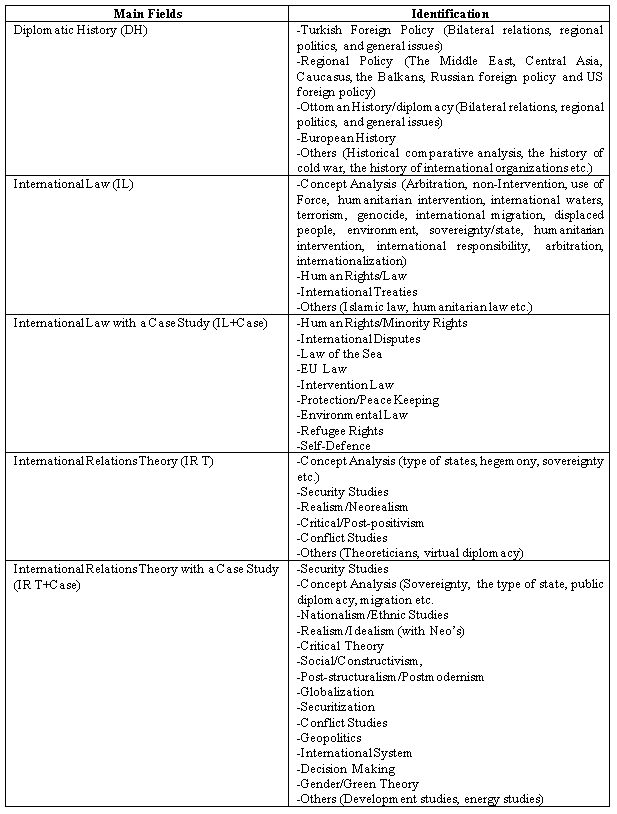
We have already mentioned that we employed the term “international relations” as a keyword instead of as an academic department while collecting the data. In order to make a comparison between dissertations written in IR departments (including PSIR) and dissertations written in IR-related departments, we used two main indicators, particularly in Part 1: “Only IR” and “Others”. While “only IR” refers to dissertations completed in IR and PSIR departments, “others” indicates dissertations in IR-related departments.
4.Evaluation of Dissertations and Findings
4.1. General findings
Turkish higher education has experienced an upward trend in the last 20 years, in terms of both an increasing number of universities and the universities’ qualifications. After 2006, the increasing number of universities, whether state or foundation-run, has not only affected the capacity for undergraduate education in Turkey, but has also triggered the creation of new PhD programs. As seen in Figure 1, the number of dissertations in IR studies has been steadily increasing since 2000. Figure 1 shows that while the number of dissertations has declined in certain years, in general, there has been a spectacular increase in the total number of dissertations. While only eight dissertations were written in 2000, the total number of dissertations reached 141 by 2020.

As mentioned earlier, topics related to IR have been addressed not only in IR/PSIR departments, but also in other departments at Turkish universities, since IR has a multidisciplinary character, and its areas of study are closely connected to other disciplines. As seen in Figure 2, the number of dissertations written in IR-related departments shows the leading role that EU and History departments have played, among other departments. Throughout the research, we found that both the number of EU-related departments and the number of dissertations in these departments increased as a result of the start of Turkey’s EU accession negotiations in 2005. On the other hand, the departments of History, Ataturk Principles and Revolutionary History, and Turkish Studies have contributed to the main field of DH. In addition, the security/strategy departments at the Police Academy, the Turkish Military Academy and the Turkish War Colleges have played an important role in the development of security studies since 2010, focusing on terrorism and terrorist organizations.

Figure 3 shows the gender distribution among PhD researchers. Until a few years ago, male scholars held a historically hegemonic position in the academic community, regardless of discipline. Although we are still far from full gender equality in the Turkish IR community, the increasing number of female researchers is a significant development. For 2019, the percentage of female research assistants in the departments of International Relations and Political Science and International Relations in Turkey was found to be 38% (compared to 50.4% in Turkey in general).[18] Clearly, this percentage is well below the average for Turkey. Looking at Figure 3, we can see a similar trend in IR studies based on PhD researchers. By 2020, the number of male researchers seems to be almost double the number of female researchers. As we can see in Figure 4-5, the ratio of male and female researchers is very close, both in the category of Only IR and in the category of Others.
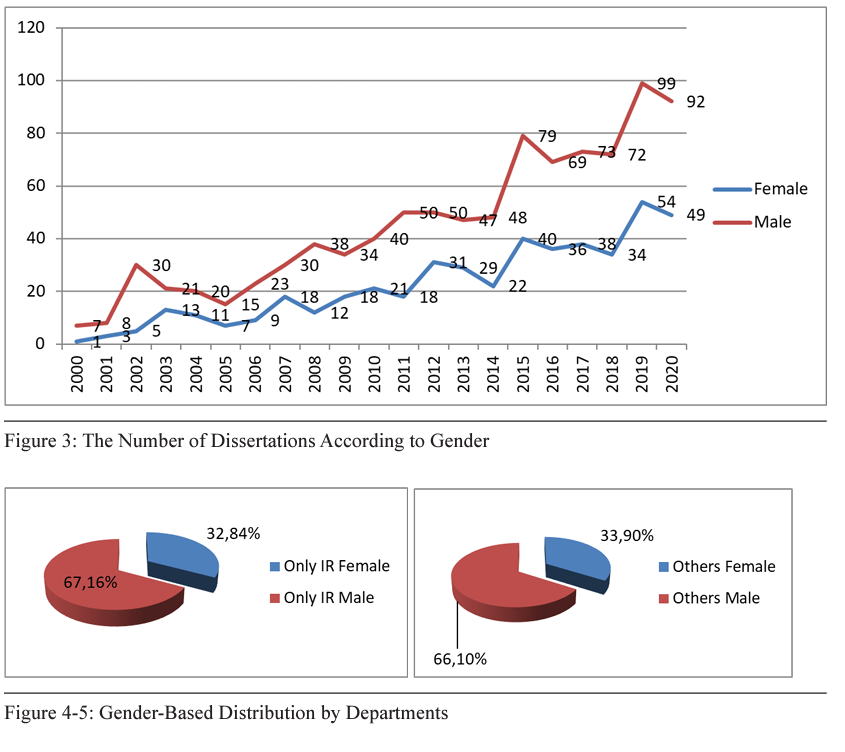
The number of Turkish state and foundation-run universities has increased significantly since the second half of the 2000s. In addition to state universities, the number of foundation-run universities has also increased significantly. Today, there are 203 universities in Turkey, of which 129 are state and 74 are foundation-run universities. However, we were unable to obtain clear information on how many of these universities offer IR or IR-related PhD programs, despite having consulted the data on the Council of Higher Education’s (YÖK) website and interviewed experts working for YÖK and the Turkish Academy of Sciences (TÜBA). Though there is a lack of clear information, we can assume that the number of PhD programs at state universities is higher than at foundation-run universities. Similarly, Figure 6 shows that the number of dissertations written at state universities is much higher than at foundation-run universities. At the same time, there has been an increase in the number of dissertations in foundation-run universities over the last twenty years. If we look at state universities, we see a remarkable increase in dissertations. Figure 7-8 shows that the number of dissertations from only IR departments at foundation-run universities is higher than those at Others. Therefore, we can conclude that the number of PhD programs in only IR departments at foundation-run universities is higher than Others.
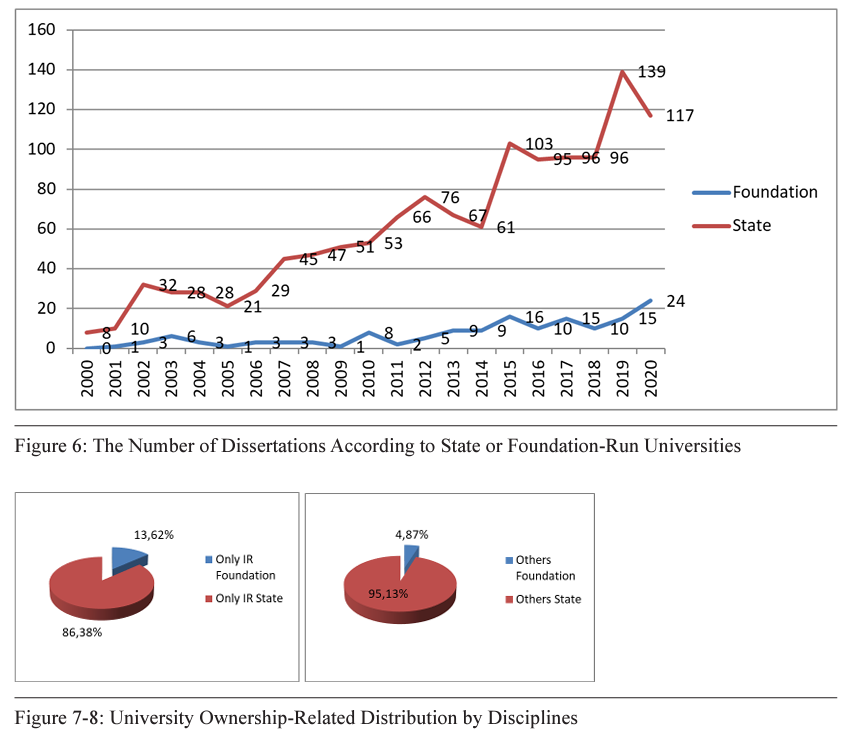
Figure 9 shows the top 10 state universities that have played an important role in producing dissertations. İstanbul University, Ankara University, and Marmara University are among the top three. While collecting the data, we also noted the existence of different PhD programs, particularly at Istanbul University and Marmara University, such as EU, Middle East, and IR studies. This situation explains why İstanbul and Marmara University are among the top three. It is also worth noting that Yıldırım Beyazıt University, with 25 dissertations, is ranked 10th as a young state university.
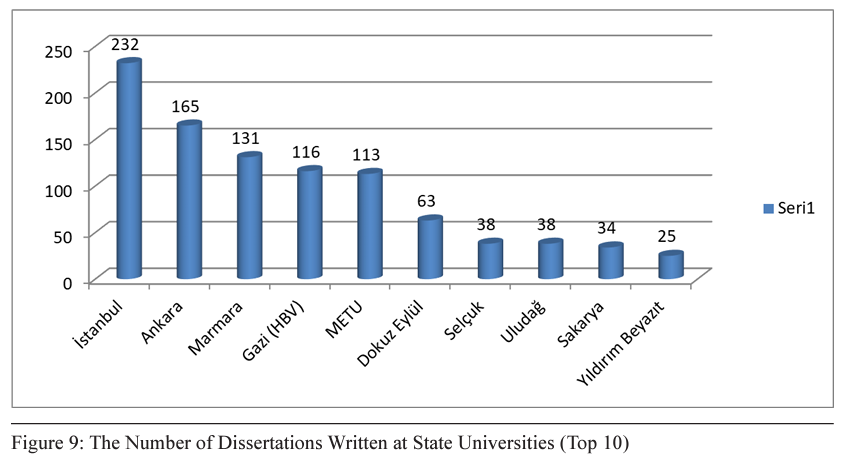
Figure 10 shows the top 10 foundation-run universities that have played a prominent role in dissertation writing. As the first foundation-run university in Turkey, Bilkent University ranks first, with 54 dissertations.
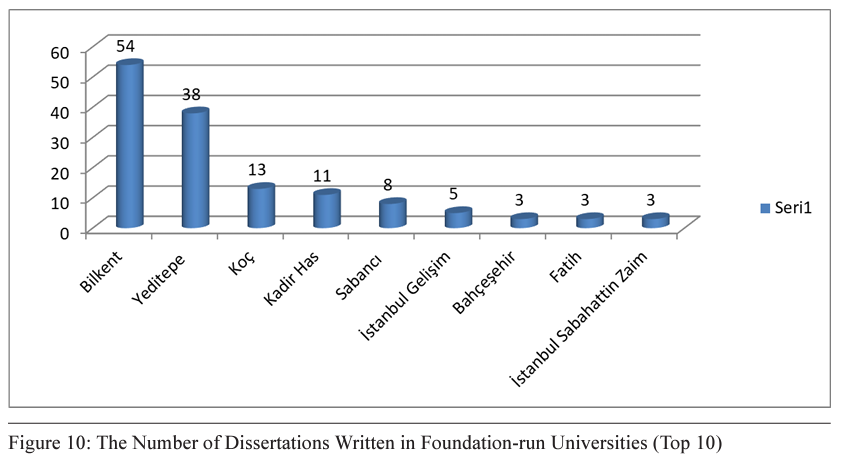
Figure 11 reveals the language used in dissertations. The number of dissertations written in Turkish is much higher than that of other languages. It should be noted that most of the foreign language dissertations are written in English (354 English, 7 French, 1 Arabic). The higher percentage of Turkish dissertations is due to the fact that most dissertations are written in such state universities as Istanbul University, Ankara University, and Marmara University, where Turkish is the language of instruction. Also crucial is the fact that 132 of the 146 dissertations written in foundation-run universities are in English. From this point of view, one can argue that foundation-run universities have done much to transcend language barriers and to contribute to global IR studies.
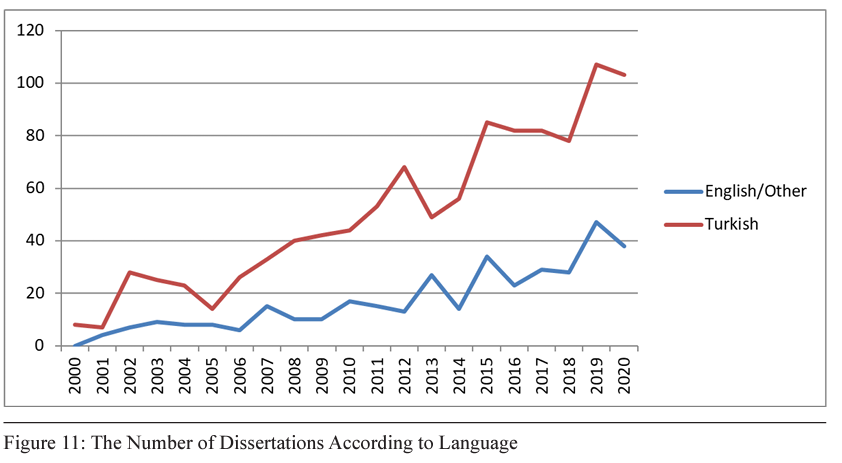
According to Figure 12-13, 30.29 percent of dissertations written in only IR departments are in English, and 17.98 percent of dissertations in Others are in English. Based on this, IR departments appear to have a distinctly “international feature” compared to Others.

4.2. Evaluation of dissertations according to the main and sub-fields of IR
Figure 14 demonstrates that the field of IR T+Case has the leading number of dissertations (633) produced among the five main fields, followed by DH and IL+Case. It is worth noting that the number of dissertations classified as IR T is quite low (58). The lowest number of dissertations was produced in the field of IL. The data show that there are still many dissertations written in the field of DH, and that DH remains a dominant research area within IR T+Case. The high number of IR T+Case dissertations might lead us to assume an increasing interest in theoretical studies in IR since 2000. However, it is important to emphasize that the majority of these studies have focused on explaining a case with a Western-oriented perspective rather than on making a purely theoretical contribution to global IR.
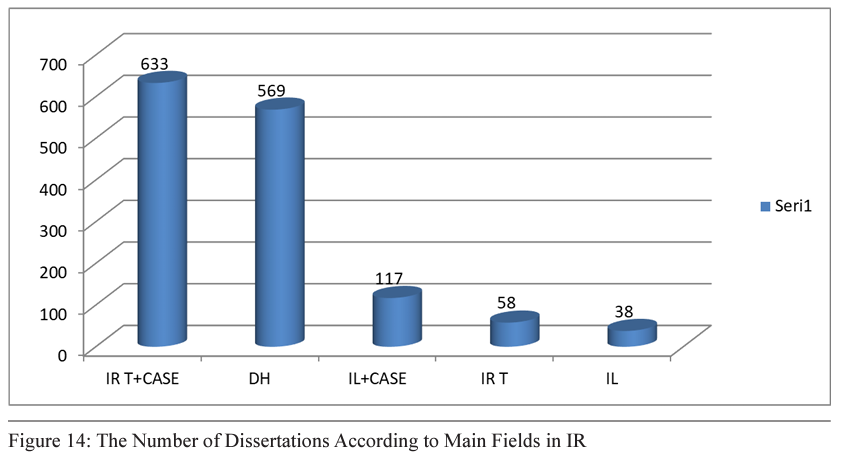
If we look at the most frequently studied topics in DH, we notice that those related to Turkish foreign policy receive far more attention than other topics, as seen in Figure 15. If we add topics related to Ottoman history/diplomacy to this theme, it becomes clear that Turkey's foreign policy attracts much more attention in DH, in line with the general opinion. Figure 16 shows that studies in this area have increased over the years, in parallel with an increase in the number of dissertations. However, compared to other fields, the increase between the years of 2015 and 2020 is remarkable. Researchers may have been influenced by crucial developments and problems in Turkish foreign policy after 2015, bearing in mind Turkish foreign policy’s entanglement in regional crises since 2011.
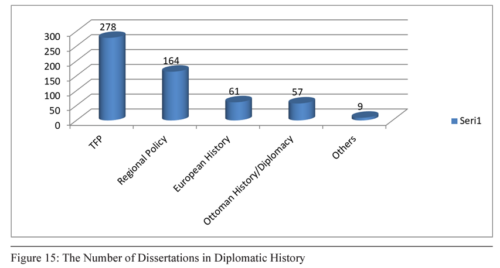
Besides TFP, one of the most studied areas of DH is regional policy, used here to refer to studies of areas such as the Middle East, Central Asia, or the Balkans. According to the data, the Middle East is the most studied region, with 60 dissertations, followed by Russian foreign policy (29) and US foreign policy (19). Looking more closely, post-2010 Iran (15) and post-2014 Egypt (12) are the most studied countries in the Middle East region. The regions of China/India (15), the Balkans (10) and the Caucasus (10) have also received significant attention within area studies. In accordance with the general opinion, although regional policy is a separate category of Turkey's foreign policy, when looking at the regions and countries studied, the countries which Turkey has regular problems with are studied more, suggesting that researchers have largely limited themselves to Turkey's foreign policy agenda within DH and, by and large, have not been interested in other areas of IR studies.
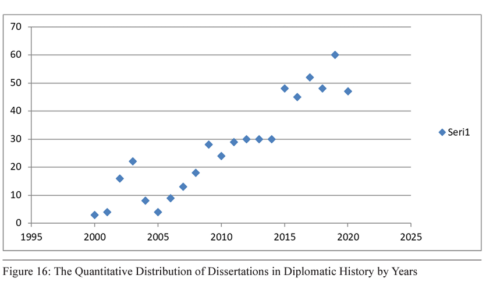
In order to determine which topics have been studied under the umbrella of TFP, we had to classify Turkish policy studies based on topics and abstracts. In the process, three sub-categories were added to TFP: bilateral relations, which refers to Turkey’s relations with a specific country; regional politics, which refers to Turkish foreign policy towards a specific region; and general, which indicates a time period or specific topic directly related to TFP. As shown in Figure 17, Turkey's bilateral relations with other countries (188) occupy a hegemonic position among studies on Turkish foreign policy. The number of dissertations written in departments related to IR is also remarkable. For example, 78 of the 188 dissertations were written in IR/PSIR departments, while 72 were written in History departments. Similarly, 15 of the 40 dissertations on EU relations were written in EU Studies departments, while 13 dissertations in this context were written in IR/PSIR departments. Clearly, as noted earlier, the contribution of History and EU Studies departments to studies on Turkish foreign policy is significant. In the case of bilateral relations, the range of countries is quite wide. However, relations with the EU (40), the US (28) and Russia/ USSR (18) were the most studied. This was followed by Middle Eastern countries (30). On the other hand, African (3) and Latin American (1) regions do not seem to occupy an important place in the research agenda of PhD students. Cyprus (6), long a key foreign policy issue, Greece (8) and Armenia (2), with which Turkey has a problematic relationship, are among the least studied countries.
Examining “regional politics” as a sub-category of Turkish foreign policy, we found that the Middle East (9) was the most studied region, followed by the Balkans (4) and the Caucasus (4) regions. The data show us that although regional policy occupies a very small place in Turkish foreign policy, the issues studied in this area are generally limited to Turkey’s neighbouring regions.
Related to data gathered on “general” issues of Turkish foreign policy, three topics seem to predominate: the foreign policy approaches of political parties (8), the foreign policy preferences of political leaders (7), and public diplomacy (6). Davutoğlu's foreign policy approach has attracted more attention among these issues between 2014 and 2019. Another interesting finding is that the general problems of Turkish foreign policy have largely been ignored by PhD students as a primary research agenda. In this context, the Cyprus issue (2), the Armenian issue (1) and the Kurdish issue (1) were the least addressed topics.
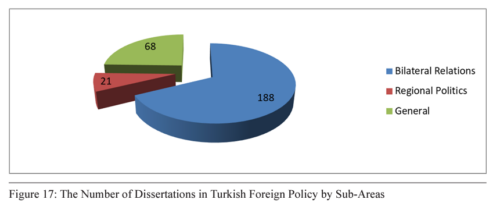
In examining dissertations in the categories of IL and IL+Case, we found that the field of international law includes very few and inadequate dissertations, both in terms of the number of dissertations in general and in terms of the diversity of topics within the field. As seen in Figure 18, concepts related to the field were mainly analysed in the category of IL. The most studied concepts were humanitarian intervention, international migration, international responsibility and sovereignty/state. In the category of “Others”, 10 different concepts that were the subject of 10 different dissertations did not provide us with statistically significant data. In addition, the subject of human rights seems to attract the most attention in international law.
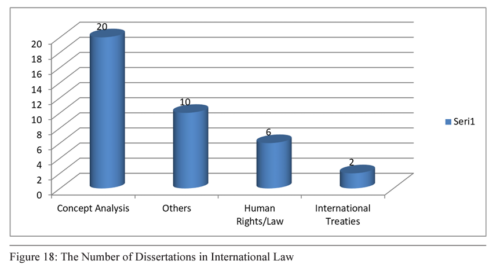
As can be seen from Figure 19, the categories of human rights and minority rights were mostly studied through a case rather than as a general IL subject. International disputes, law of the sea, EU law, intervention law, protection/peacekeeping, environmental law, refugee rights and self-defence in the main field of IL+Case appear to have attracted research attention to a similar extent. Notable is that in the field of law of the sea, studies on the dispute between Greece and Turkey over maritime territories were the most prominent (6), and that law and EU-related departments of universities have made a significant contribution to the fields of EU law and law of the sea. There is consequently a major deficit in the field of international law in IR/PSIR departments; the field seems to be generally ignored by IR researchers.
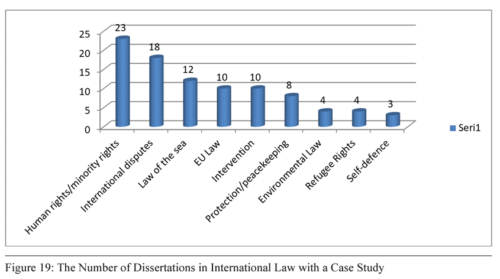
Looking at Figure 20, IR researchers in Turkey appear to have little interest in IR T, in accordance with the main argument mentioned at the outset. While only 58 out of 1,415 dissertations are in the field of IR T, the number of researchers dealing with case studies in a theoretical framework is many times higher than the numbers of IR T, as seen in Figure 14 and Figure 22. This comparison yields an intriguing result: Although IR researchers are familiar with Western-oriented IR theories and are very willing to apply IR theories to their dissertations, they do not have the same passion to make theoretical contributions to Global IR studies by developing a new approach or perspective.
If we look more closely at the distribution of topics in IR T, conceptual analysis has clearly played a leading role among other topics, as we see in the main field of IL. The most studied subjects were sovereignty (4), different types of states (4), war (3), and hegemony (2). Conceptual analysis was followed by security studies. In this field of study, the most important topics were national security, energy security, and environmental security. Further, the most studied theories were realism, neorealism, and critical and post-positivist approaches. In terms of universities, state universities seem to give more attention to theoretical studies as compared to foundation universities (86%). While foundation universities contributed to this area, with eight dissertations, Bilkent University (5) has contributed the most. Considering the distribution of dissertations in IR T by year in Figure 21, there is no significant increase. It should be noted here that the studies in question aimed to contribute to existing theories and concepts rather than to develop a new theory or perspective.
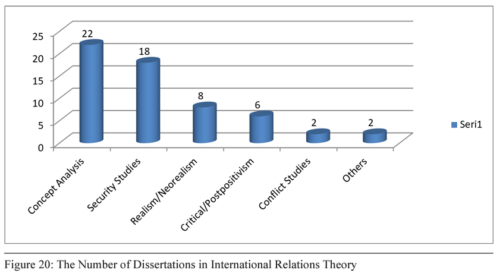
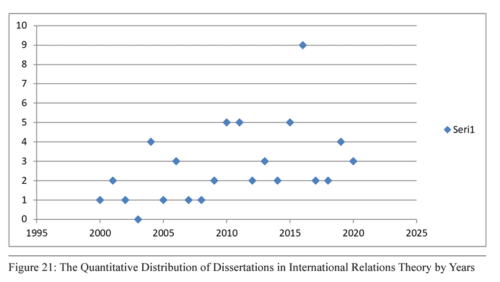
Examining Figure 22, we see that studies in the main field of IR T+Case have mostly focused on security studies.[19] There are two possible explanations for this. First, the security concerns that shape Turkish foreign policy have led to an increased interest among researchers in security studies. In this context, 84 of the 168 studies focused on issues directly related to Turkey's national security priorities (security relations with NATO, the USA and the EU, the PKK, the Black Sea, the Eastern Mediterranean, or energy security), while other studies were tangentially related to Turkey’s security concerns (such as Afghanistan and Al-Qaeda). Second, the high number of security studies is due to the high number of dissertations completed in the security studies departments of the Turkish Military Academy, the Police Academy and the Turkish War Colleges after 2010 (35).
It is generally accepted that female IR researchers mainly deal with cases from the perspective of constructivism, post-positivism, and peace studies rather than from the perspective of security, war, and military studies.[20] In this context, an evaluation of the data reveals that female researchers have carried out more studies (242/633) in the IR T+Case category than the general average of all studies. While the rate of studies produced by female researchers in the field of security is 20%, the rate of studies involving critical theory and post-positivist approaches is 28%. For male researchers, this rate is 30% and 19%, respectively. Evaluating these ratios, female researchers are seen to have conducted more studies in the fields of constructivism, post-positivism, and peace studies than male researchers. However, contrary to the general belief, female researchers do not appear to be less interested in security studies.
Besides security studies, one of the most studied areas is conceptual analysis. Here again, as in the categories of IL and IR T, the concepts of sovereignty and the state were the most analysed (10). Such further concepts as humanitarian intervention, international intervention, terrorism, migration, pre-emptive war, soft power and public diplomacy have also been examined since 2007. The most analysed case within these concepts is Turkey. Researchers in this category also tend to have a Turkey-based research agenda rather than a global approach. It is seen that the third most studied area is nationalism/ethnic studies/minorities. Turkey has been studied mostly as a case study (22) in this area as well. Additionally, EU identity construction (11), nationalism in Russia and the Caucasus (9), and minorities in the Middle East and the Balkans (13) have made up the general research topics. If we analyse this data on the basis of university, it is seen that foundation universities have contributed most to this category at 80 studies, with the largest contribution coming from dissertations at Bilkent University (32).
Consequently, as seen in Figure 23, unlike other categories, the category of IR T+Case has seen a steady upward trend on a yearly basis, with a particular increase from 2019 to 2020. This trend suggests that the tendency of IR researchers to use theories as a main framework for their case studies will continue and increase.
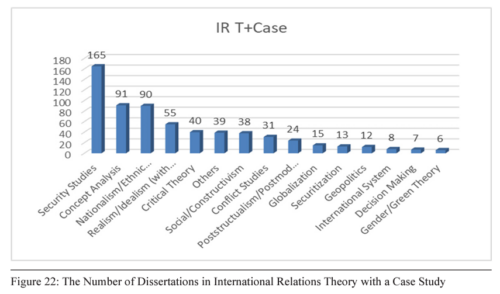
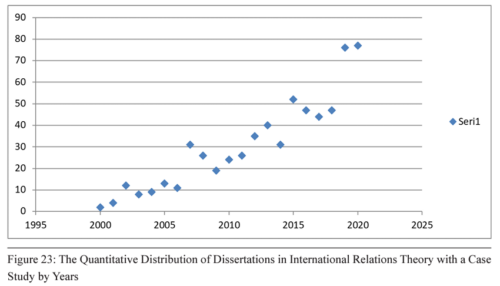
5. Conclusion
Focusing on dissertations in IR written at Turkish universities over the last twenty years, this study has determined the trajectory of the discipline of IR in Turkey in two ways. First, we reached four general findings about the situation of our discipline and of IR researchers. The first is that the number of dissertations in IR studies has been steadily increasing since 2000. The second finding is that in terms of gender distribution among IR PhD researchers, we have yet to achieve full gender equality in the Turkish IR academic community, even if the number of female researchers (33 %) in our discipline has been steadily increasing. The third finding of our study is that the number of dissertations written at state universities is much higher than at foundation-run universities. In terms of foundation-run universities, Bilkent University, the first foundation-run university in Turkey, ranks first. Our last result here is that Turkish has been the most used language in dissertations, with English as a notable second. According to the language-based classification, foundation-run universities have contributed more than state universities to overcoming researchers’ language barriers, en route to greater integration into the global IR academic community.
In addition to these general findings, our study shows which area has dominated IR and IR-related dissertations over the last twenty years in Turkey. One important caveat is in order. Examining 1,415 dissertations through content analysis presented the researchers with significant practical challenges. As noted earlier, we evaluated dissertations according to the five main fields. By this classification, clearly, the field of IR T+Case has the highest percentage, with 633 out of 1,415 dissertations, followed by DH and IL+Case. IR T and IL studies remain the lowest.
In light of this, four important findings are worth noting. First, the hegemony of IR T+Case might lead us to assume that such researchers have contributed to IR theories through their dissertations, in comparison to the other main fields. But the majority of IR T+Case dissertations have focused on explaining a case or a problem through a Western-oriented theory rather than setting in motion a theoretical discussion. Therefore, the high number of studies in this area does not mean that Turkey’s dependence on the Western-oriented IR discipline is low. Looking more closely at the IR T+Case field, we see that security studies, conceptual analysis and nationalism studies predominate in dissertations. Considering the number of security studies and concepts in dissertations, realist and neorealist theories have had a significant impact on Turkish IR researchers and their theoretical frameworks. The high number of studies on nationalism and constructivism as a theoretical framework also shows us that such studies on national identity are highly valued in Turkey, as in other peripheral/Third World countries.[21] Another interesting finding is the selection of case studies. Regardless of the theoretical framework employed, preferences tend to Turkey, or else to a country in line with TFP, for case studies. This finding leads us to conclude that Turkish researchers still maintain a research agenda focused largely on Turkish foreign policy.
Second, DH is the second main field to have attracted the attention of researchers, in addition to IR T+Case. The data has shown that TFP is the most studied area under the category of DH, especially in the context of bilateral relations. Within Turkey’s bilateral relations, the EU as a transnational organization has been among the most studied topics. Considering the beginning of Turkey’s negotiation process with the EU after 2004, this growing interest is understandable. On the other hand, dissertations on Turkey’s bilateral relations with Middle Eastern countries have enjoyed increasing attention since 2015, essentially reflecting Turkey’s troubled relations with the region.
Third, the data reveal that the field of IL has been systematically ignored since 2000. If we add the category of IL+Case (117) to IL (38), only 155 of 1,415 dissertations have been directly related to International Law. In addition to the number of such studies, IL and IL+Case fields are further limited in terms of the diversity of topics. In line with the spirit of the times, humanitarian intervention, international migration, international responsibility, and state/sovereignty problems rank high among the subjects of the field of IL+Case.
Fourth, the data appears to show that purely theoretical studies occupy a small place among dissertations, with 58 dissertations in IR. This small number seems to support the main argument that we emphasized at the beginning of this study. Additionally, classifying IR T dissertations in terms of their abstracts and keywords, we concluded that IR T dissertations consist of “concept analysis”, “security studies”, “realism/neorealism approach”, “critical/post positivist approach” and “conflict studies”. Researchers thus appear to tend toward discussions based on Western-oriented IR theories rather than toward developing an alternative perspective. That said, even in light of the limited theoretical contributions of Turkish IR studies to the global discipline of IR, our study has nonetheless pointed to a flourishing of different subjects and areas in IR studies, as well as to the growing interest of researchers in our discipline.
Acharya, Amitav. “Global International Relations (IR) and Regional Worlds: A New Agenda for International Studies.” International Studies Quarterly 58, no. 4 (2014): 647–59.
–––. “Küresel Uluslararası İlişkiler.” In Uluslararası İlişkiler Teorileri, edited by Tim Dunne, Milja Kurkive, Steve Smith. Translated by Musa Ceylan, 397–418. Ankara: Felix Kitap, 2021.
Açıkalın, Şuay Nilhan, and Nilay Neyişçi. “A Review of Graduate Dissertations on Migration in Turkey: 1967-2018.” OPUS Uluslararası Toplum Araştırmaları Dergisi 16, no. 29 (2020): 1628–641.
Alkar, Elif, and Emin Atasoy. “Türkiye’de göç üzerine yapılan doktora tezlerine yönelik bir içerik analizi.” Tesam Akademi Dergisi, no. 1 (2020): 67–89.
Aydın, Mustafa. “Türkiye’de Uluslararası İlişkiler akademisyenlerinin bilimsel araştırma ve uygulamaları ile disipline bakış açıları ile siyasi tutumları anketi.” Uluslararası İlişkiler 4, no. 15 (2007): 1–31.
Aydın, Mustafa, and Cihan Dizdaroğlu. “Türkiye’de Uluslararası İlişkiler: TRIP 2018 Sonuçları Üzerine Bir Değerlendirme.” Uluslararası İlişkiler 16, no. 64 (2019): 3–28.
Aydın, Mustafa, and Korhan Yazgan. “Türkiye’de Uluslararası İlişkiler akademisyenleri araştırma, eğitim ve disiplin değerlendirmeleri anketi-2009.” Uluslararası İlişkiler 7, no 25 (2010): 3– 42.
Aydınlı, Ersel, and Julie Mathews. “Are the Core and Periphery Irreconcilable? The Curious World of Publishing in Contemporary International Studies.” International Studies Perspectives 1 (2000): 289–303.
Aydınlı, Ersel, and Gonca Biltekin. “Widening the World of IR: A Typology of Home-grown Theorizing.” All Azimuth 7, no. 1 (2008): 45–68.
Aydınlı, Ersel, and Julie Mathews. “Periphery Theorising for a Truly Internationalised Discipline: Spinning IR Theory Out of Anatolia.” Review of International Studies 34 (2008): 693–712.
Balcı, Ali, Filiz Cicioğlu, and Duygu Kalkan. “Türkiye’deki uluslararası ilişkiler ve bölümlerinin akademik etkilerinin Google Scholar verilerinden hareketle incelenmesi.” Uluslararası İlişkiler 16, no. 64 (2019): 58–75.
Bilgin, Pınar, and Zeynep Gülşah Çapan. “Introduction to the Special Issue Regional International Relations and Global Worlds: Globalising of International Relations.” Uluslararası İlişkiler 18, no. 70 (2021): 1–11.
Çokişler, Elvan. “Uluslararası Ilişkiler Dergisi’nin bibliometric analizi (2044-2017)” Uİ Dergisi no. 64 (2019): 29–56.
Demir, Cenker Korhan, and Engin Avcı. “Turkish Terrorism Studies: A Preliminary Assessment.” All Azimuth 7, no. 1 (2018): 21–44.
Demirtaş, Birgül, and Zuhal Yeşilyurt Gündüz. “Türkiye’de Uİ disiplininde kadın akademisyen olmak: cam tavanlar ve fildişi bodrumlar.” Alternatif Politika 12, no. 1 (2020): 228–59.
Diadato, Virgil P., and Peter Gellatly. Dictionary of Bibliometrics. New York: Routledge, 1994.
Dönmez Rasim Özgür, and Kasım Timur. “An Evaluation of Ph.D. Dissertations on Terrorism Studies in Turkey.” Alternatif Politika no. 1 (2017): 131–41.
Erdoğan, Emre. “Türkiye’de uluslararası ilişkiler ve ilişkili dallarda görev yapan akademisyenlerin ilişkisellikleri: bir sosyal ağ analiz denemesi.” In Türkiye’nin modernleşme süreci ve Mekteb-i Mülkiye, edited by Orhan Çelik, Can Umut Çiner and Abdullah Pekel, 485–515. Ankara: Ankara Üniversitesi Basımevi, 2021.
Hoffmann, Stanley. “An American Science: International Relations.” Daedalus 106, no. 3 (1977): 41–60.
George, Alexander L. “İçerik çözümlemesinde nicel ve nitel yaklaşımlar.” In İletişim araştırmalarında içerik çözümlemesi. Edited and translated by Murat Sadullah Çebi, 9–47. Ankara: Alternatif Yayınları, 2003.
Holsti, K. J. The Dividing Discipline: Hegemony and Diversity in International Theory. Boston: Allen & Unwin, 1985.
Kuru, Deniz. “Homegrown Theorizing: Knowledge, Scholars, Theory.” All Azimuth 7, no. 1 (2018): 69–86.
Lawani, S. M. “Bibliometrics: Its Theoretical Foundations, Methods, and Applications.” International Journal of Libraries and Information Studies 31, no. 4 (1981): 294–315.
Öner, Selcen, and Merve Özdemirkıran. “Uluslararası İlişkiler (Uİ) disiplininin eril dili ve Türkiye’de kadın Uİ akademisyenlerinin disiplinin eril diline bakışları.” Alternatif Politika 9, no. 3 (2017): 361–84.
Palmer, Norman D. “The Study of International Relations in the United States: Perspectives of a Half Century.” International Studies Quarterly 24, no. 3 (1980): 343–63.
Turan, İlter. “Area and International Studies in Turkey: The Case of the United States.” All Azimuth 1, No. 1 (2012): 50–63.
Waever, Ole. “The Sociology of a Not So International Discipline: American and European Development in International Relations.” International Organization 52, no. 4 (1998): 687–727.
Wood, Judith. “The Growth of Scholarship: An Online Bibliometric Comparison of Dissertations in the Sciences and Humanities.” Scientometrics 13, no. 1-2 (1988): 53–62.
Yazgan, Korhan. “The Development of International Relations Studies in Turkey.” PhD diss., University of Exeter, 2012.
Yüksel, Metin. “Iranian Studies in Turkey.” Iranian Studies 48, no. 4 (2015): 531–50.

